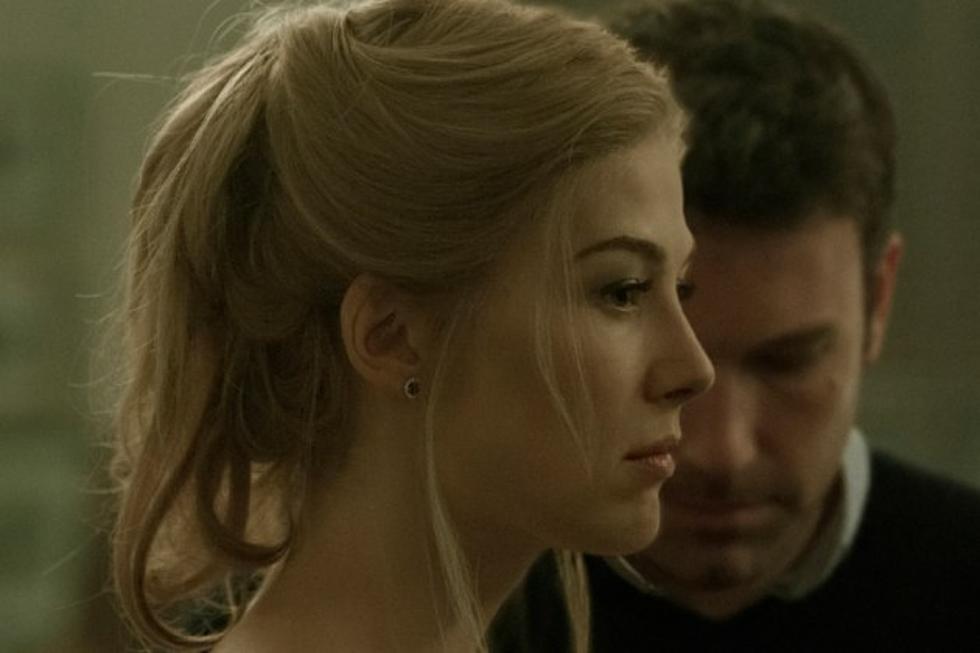
‘Gone Girl’ and the War Against Ambiguity
[Spoilers follow regarding the ending of 'Gone Girl,' as well as other movies.]
Don’t believe the pre-release speculation – when 'Gone Girl' arrives in theaters this Friday (after premiering last week at the New York Film Festival), its original ending is (in spirit, if not exact detail) intact. That’s sure to rankle some of the countless readers who originally objected to Gillian Flynn’s 2012 best-seller on the basis of its conclusion. Which – here come those spoilers! – not only doesn’t provide fitting punishment for its icy blonde femme fatale, but leaves its married characters in something of a state of suspended animation -- trapped in a miserable union that may ultimately drive them to ever-worse behavior. The vagueness of the outcome for Nick Dunne and his missing wife Amy was a sore point for readers, who – as evidenced by things like THIS and THIS and THIS – cried foul over the absence of a resolution in which the wicked were punished, and more to the point, the couple’s future was clear. Flynn’s ambiguity was decried. Concrete answers were demanded!
In light of that chorus of disapproval, Fincher’s film (starring Ben Affleck and Rosamund Pike as Nick and Amy) is likely to be met with similar objections, especially given its faithfulness to its source material – as well as to the ever-mounting desire by pop-culture consumers to have things spelled out for them in clear-cut terms.
From covertly snapped set photos to advance promotional clips to theatrical previews to an endless stream of articles that parse every new movie-related tidbit down to the bone -- the Internet sells spoilers with uninhibited glee.
Take, for instance, the persistent uproar over 'The Sopranos'’ cut-to-black closer, which left the fate of James Gandolfini’s mob bigwig Tony in doubt. Did he die? Did he survive? Recent comments by creator David Chase further stoked fans’ fire to conclusively answer that question, poring over details of the scene -- and clues that had been laced throughout the season –- in a desperate attempt to come up with a theory that explained everything in an air-tight manner. No matter that Chase himself has since backtracked on his “Tony didn’t die” statement and reiterated that there is no single explanation; even without consensus, some fans demanded, and continue to demand, that there by only one, inarguable reading of The Sopranos’ last scene.
The result is an ongoing “discussion” ... seemingly without end.
The finales of both 'Gone Girl' and 'The Sopranos' willfully avoid providing an absolute truth. They’re meant to leave viewers hanging, so that an air of indefinite mystery might forever linger over the material. That’s also true of 'Inception,' of 'The Grey,' and of 'No Country for Old Men,' to name just three contemporary high-profile films whose up-in-the-air endings rankled viewers. In all of these cases, the problem was clear – without the filmmaker making his or her intentions explicit, people were left to figure out unsolvable mysteries, and thus felt confused, and then became upset/angry/dissatisfied by that confusion. Which raises the question: after decades of classic fictional works marked by uncertain endings, why do consumers of fiction now so stridently object to ambiguity?
To some extent, blame can be placed on the corrosive “turn off my brain” syndrome embraced by many moviegoers, who’d apparently prefer to not have to think – at all, not even for a second, because their brain has been switched to the off position! – about what they’re actually watching. The notion that a movie, or book, might compel them to figure things out on their own, or concoct their own interpretations of what’s transpired, is taken as a galling affront to their interest in spending a casual Friday night being passively spoon-fed entertainment. And the idea that a movie might dare to engage them by leaving its ending in doubt? I mean, the nerve!
Intellectual laziness is certainly a factor in this phenomenon. But it’s also clear that there’s more at play here, and it seems to begin in the same place you’re reading this article: the Internet. The online arena is now one in which instant gratification is expected on a daily basis. From covertly snapped set photos to advance promotional clips to theatrical previews to an endless stream of articles that parse every new movie-related tidbit down to the bone -- the Internet sells spoilers with uninhibited glee. No surprise is too big that it can’t, or shouldn’t, be ruined ahead of time, all so that viewers can know as much as possible before they even arrive at the multiplex.
One would think that acquiring such premature knowledge would ruin the cinematic experience. However, the Internet’s thriving cine-gossip business confirms that the opposite is true: for millions of movie fans, the more concrete early info, the better. Thus, with an ending like Gone Girl’s, which abruptly leaves Nick and Amy reunited in less-than-blissful matrimony (and impending parenthood), there’s an inevitable push-back against the sheer audacity of a work not fulfilling its obligation to fully resolve everything.
The requirement that all art be solvable is, relatively speaking, recent – or, at least, one escalated by the Internet’s everyone-has-a-voice nature – since cinema history is littered with great pulp films that end on an unsettled, or beguiling, or downright baffling note. Think '2001: A Space Odyssey,' 'Dawn of the Dead,' 'Picnic at Hanging Rock,' 'The Shining,' 'The Thing,' 'Total Recall.' Or the director’s cut of 'Blade Runner,' which raises, but never absolutely lays to rest, the question of its protagonist’s very humanity. No one today blanches at those genre films’ ambiguity, demanding that Kubrick’s Star Child be properly identified, or that John Carpenter clearly demarcate which of his remaining two protagonists is a shape-shifting alien, or whether Arnold Schwarzenegger’s Mars-set adventure was all in his mind. Which, of course, is more than a bit ironic, given that it’s genre cinema fans who are apt to covet endless online advance-word details about upcoming projects, and to cry foul when their expectations are not satisfied.
Those films are accepted as-is because, as art-lovers have long recognized, ambiguity is a vital element of storytelling, be it in literature ('Finnegan’s Wake,' 'The Trial'), or in theater ('Waiting for Godot'), or in cinema. Yet it’s a lesson that appears to have been somewhat lost, drowned out by an online culture that demands predictable, easily digestible art on an immediate basis. As with 'Gone Girl,' to object to something based purely on “I want to know what really happened/happens next” grounds is to misunderstand that nothing stokes the imagination, generates terror, or creates haunting dread more than an ending that rejects being completely solved.
More From ScreenCrush









